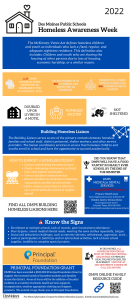
Thank you to DMPS homeless liaison Lyn Marchant for providing the flyer and information for this blog post. Click on the image to view larger.
Homelessness is a nationwide problem, and here in Des Moines, a local one. The size of our challenge may surprise you. The number of homeless students in Des Moines is greater than the total enrollment at 200 Iowa school districts.
Students are living with more than one family in a household, staying in a hotel or homeless shelter, or are living in cars or tents. In Des Moines, 900 students are identified as being homeless right now.
Because their families are constantly on the move, homeless children face special challenges when it comes to getting an education. Homeless families move often due to limits on shelter stays, job searches, searches for a permanent residence, or to escape abusive partners or other violent acquaintances.
As a result, homeless children may change schools because the shelters or other temporary accommodations are located in a different part of town or school district. As issues persist, it is common for absenteeism to increase, grades to decline and relationships to suffer.
Every time children must transfer to a new school, their education is disrupted. Statistically speaking, this causes them to be held back one or two grades. Twenty-three percent of homeless students must repeat a grade compared to 1.5 percent of non-homeless students. This diminishes the importance of education to these children and can negatively impact their desire to engage in education.
The more quickly we can get supports in place, the better outcomes we will see for a student experiencing homelessness.
Why is it important for people to become aware of homelessness?
If we can recognize the signs of homelessness early on, we can connect students to resources and supports that could mitigate or alleviate some of the negative impacts that homelessness has on a child’s physical, emotional, and mental health. Earlier intervention = better outcomes.
What are the signs of homelessness?
- Enrollment at multiple schools, lack of records, poor/inconsistent attendance.
- Poor hygiene, unmet medical/dental needs, wearing the same clothes repeatedly, fatigue.
- Social and behavioral challenges such as extreme shyness, withdrawal, aggression.
- Lack of participation in field trips and/or afterschool activities, lack of basic school supplies, inability to complete special projects.
Why is it important for our staff to be on the lookout and prepared to assist students who become homeless?
School staff often have the closest relationships with students and families. They have spent time and energy earning trust and respect and often are the first to get a glimpse into the lives of students. They are the first to notice when a child is arriving at school hungry, with hygiene needs, wearing the same clothing for multiple days. They may be the first to hear a child is sleeping in a car at night.
Teachers are not alone in this work. They can connect families with the school’s homeless liaison to ensure wraparound supports are quickly put into place. Des Moines Public Schools has access to transportation, food, and medical resources. We know that homelessness impacts the social and emotional skills, as well as the mental and physical health of a student. DMPS partners with so many service providers that provide supportive care. The sooner a staff person identifies that a child might be homeless, the faster families can be connected to supportive services.
What would homeless students like teachers to know about working with them in the classroom?
Leia: “Treat them like any other student. Don’t treat them any differently just because they are homeless.”
Blaze: “It might help to know what the student is going though, so teachers should know who you’re talking to and make a game plan once you get to know the student. It’s important not to do more harm than good by assuming things.”
More information:
The district is fortunate this year to have received a Principal Foundation Grant of $100,000 to support the increased needs of the homeless students and families. Areas of focus will be the addition of laundry facilities in schools, health services support, transportation, weather appropriate clothing, and hygiene products.
If you or someone you know is experiencing homelessness, please contact Primary Healthcare Centralized Intake for shelter placement. PHC is located at 1200 University Avenue and can be reached at 515-248-1850. Also, reach out to your teacher or school for support. All help is confidential, and staff are waiting to assist you. You may also fill out the student support form to access assistance.





